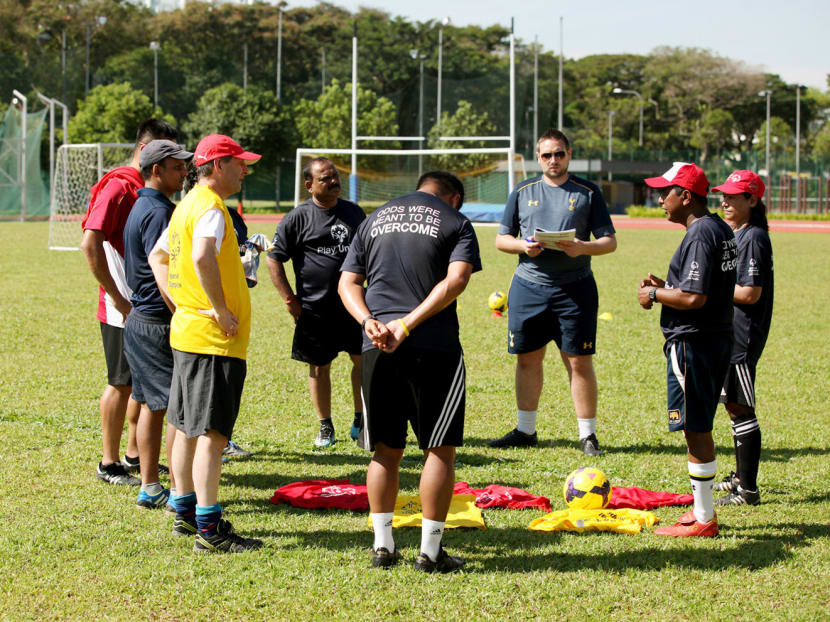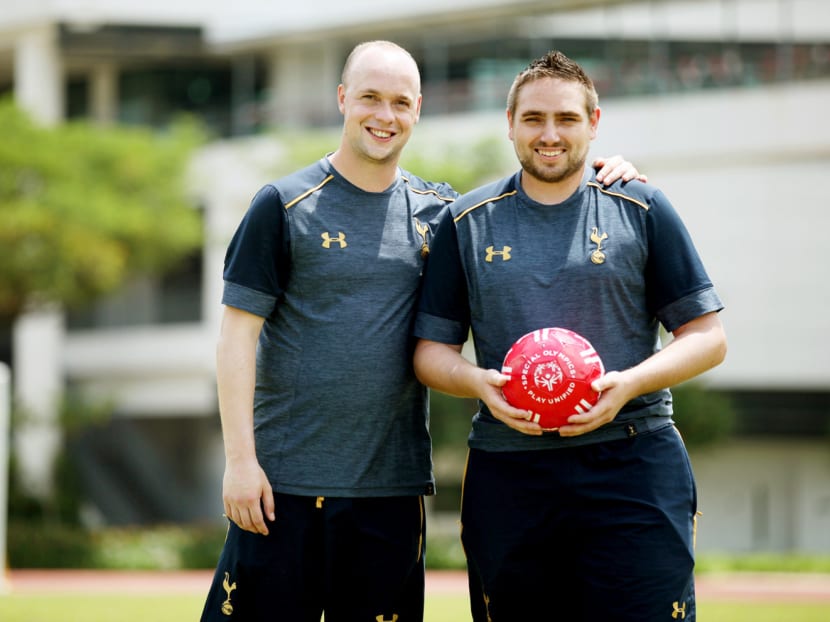Change mindsets, not training, for special-needs players
SINGAPORE — In more than 10 years of working in disability sport and football, Dan Slaughter has often been asked by coaches from all over the world: “How should I change my usual training session to suit someone with an intellectual disability?”


SINGAPORE — In more than 10 years of working in disability sport and football, Dan Slaughter has often been asked by coaches from all over the world: “How should I change my usual training session to suit someone with an intellectual disability?”
Slaughter’s answer is simple: Do not. Instead, the senior equalities and inclusion coordinator at the Tottenham Hotspur Foundation (THF) advocates including people with intellectual disabilities in regular training sessions or competitions.
“Sport and football should be the same for everyone,” Slaughter told TODAY in an interview last week. “That’s the mission of the Spurs foundation and the Special Olympics. We want everyone to be involved in sport and football. There is no issue if you happen to have a player with intellectual disabilities in your session. Just do what you normally do, but be mindful that this person might need a bit more support or have something done slightly differently.
“Don’t be scared of asking the athletes questions … that’s the best way to understand them.”
This spirit of inclusivity is one that Slaughter and the THF, along with the Special Olympics — a global organisation that aims to transform the lives of people with intellectual disabilities — wants to spread globally.
That is why both THF and the Asia-Pacific branch of the Special Olympics decided to come together and conduct training clinics to help football coaches in the region better understand how to work with intellectually disabled athletes.
The programme, which was successfully piloted in India two years ago, was extended to the Asia-Pacific region last year when they conducted the first of three modules for more than 60 volunteer coaches from Singapore and countries such as Australia, Sri Lanka and Papua New Guinea.
In the first module, coaches were taught about the social development of players with intellectual disabilities, and learnt how to enable these athletes to become better people.
Twenty-two coaches were then selected for the second module, which was held at ITE College West last Wednesday to Saturday.
“Module 2 focuses purely on developing a culture of excellence for the coaches and athletes,” explained Slaughter. “So it’s about how we can take it to the next step in terms of our delivery as coaches.
“This workshop will not only focus on improving the (participants’) football coaching and strategy development. We’re also looking at social change messages, imparting messages about health, employment and life-skills through the medium of football.”
The programme has had an impact on some of the participants. “It’s been an eye-opening experience for me — seeing athletes with intellectual disabilities take part and be included in the same drills and activities that we conduct for people without intellectual disabilities,” said ITE lecturer and former S.League footballer Shasi Kumar.
“Before joining the (programme), I thought that the athletes with intellectual disabilities did drills on their own, apart from the rest. But when you have an inclusive environment, you realise that the athletes with intellectual disabilities can take part in the same drills as everyone else, and do just as well. Not only that, it made them happy to be part of the same session, and so they would put in more effort.”
After the second module, up to 15 coaches will be selected for Module 3, that will equip them with the skills to be a “Master Trainer” and qualify them to train other coaches for athletes with intellectual disabilities.
Throughout all three modules, it is the same message of unity and inclusivity that is emphasised, as the Special Olympics works towards correcting the misconception that people with intellectual disabilities cannot work with others.
“We’re trying to tell the coaches that they don’t need to change their technical delivery as much as their perception of what they’re doing,” said Special Olympics Asia Pacific’s director of organisational development Dipak Natali.
“And we’ve seen that after attending this workshop, the coaches’ attitude of including a person with intellectual disabilities has changed. The idea that they couldn’t work with a person with intellectual disabilities is now gone. They now know that people with intellectual disabilities can do what we can do, just that they may need more guidance and time.
“We’re not trying to change the way in which football is delivered. We’re saying it is possible for football to be delivered in a more inclusive way, where people with and without ID can train and play together.”
Slaughter, who has a brother and cousin with intellectual disabilities, added: “Ultimately, we’re the issue. The disabled person is not the problem. We create the problem out of nothing by not accepting them into society. They have a voice, they want to do sports and play football, but they just need people to listen to them. So if we change our mindsets as coaches, then we can involve them in our regular sporting activities and allow them to live healthier and more active lives.”





